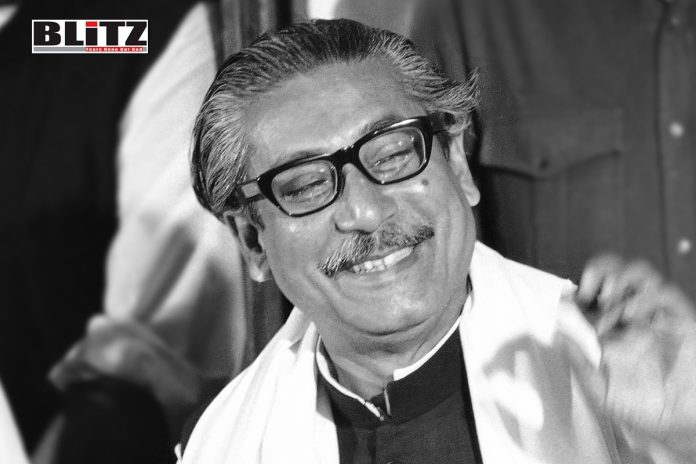The birth anniversary of Bangabandhu Sheikh Mujibur Rahman is a momentous occasion that calls for deep reflection on the remarkable life and lasting impact of the Father of the Nation of Bangladesh. His journey, from humble beginnings to becoming the architect of Bangladesh’s independence, is a testament to his unwavering dedication to the principles of nationalism, democracy, secularism, and socialism. As we commemorate this auspicious day, we are reminded of Bangabandhu’s indelible imprint on the history and identity of Bangladesh.
Born into a period of profound political and social upheaval, Bangabandhu emerged as a towering figure whose vision and leadership galvanized the Bangladeshi people in their quest for self-determination. His early years were marked by a keen awareness of the injustices faced by the Bengali populace under Pakistani rule. Inspired by the ideals of freedom and equality, he became a vocal advocate for the rights of his fellow countrymen, laying the groundwork for the independence movement that would eventually lead to the birth of Bangladesh.
The year 1972 holds particular significance in the annals of Bangladeshi history, as it marked the triumphant return of Bangabandhu from his internment in Pakistan. On January 10th of that year, amidst scenes of jubilation and euphoria, he arrived in Dhaka, the capital of independent Bangladesh, to a hero’s welcome. His return symbolized the culmination of a long and arduous struggle for independence, signaling the dawn of a new era of hope and promise for the Bangladeshi people.
Central to Bangabandhu’s ethos was his deep appreciation for the rich cultural and literary heritage of Bangladesh. He believed that this heritage served as the bedrock of Bangalee identity and nationalism, instilling in the people a sense of pride and belonging. His vision of Shonar Bangla-a land of golden dreams and aspirations-captured the imagination of millions and became a rallying cry for the nation’s aspirations.
In his historic address at Palam Airport, New Delhi, Bangabandhu encapsulated the essence of Bangladesh’s journey to independence-a journey from darkness to light, from captivity to freedom, and from desolation to hope. His words resonated with the collective consciousness of the Bangladeshi people, inspiring them to forge ahead with renewed determination and resolve.
Upon his return to Dhaka, Bangabandhu wasted no time in getting to work on the monumental task of nation-building. He embarked on a comprehensive program of reconstruction and development, focusing on providing relief and rehabilitation for the millions of Bangladeshis who had been displaced by the war. His leadership during this critical period laid the foundation for the emergence of Bangladesh as a modern and vibrant nation.
As a statesman and gifted orator, Bangabandhu’s speeches were imbued with wisdom, compassion, and a deep sense of humanity. At Suhrawardy Uddyan, he urged his compatriots to embrace inclusivity and tolerance, cautioning against violence towards non-Bangalees while advocating for the safe repatriation of stranded Bangalees in Pakistan. His commitment to justice was unwavering, as evidenced by his efforts to hold accountable those responsible for atrocities committed during the liberation war.
Bangabandhu’s international stature was equally remarkable, as he navigated the complex geopolitical landscape with finesse and diplomacy. His solidarity with Islamic nations during the 1973 war between Egypt and Israel underscored Bangladesh’s commitment to global peace and cooperation. His efforts to strengthen ties with India culminated in landmark agreements such as the Joint Rivers Commission and the historic Land Boundary Agreement, which resolved longstanding disputes and fostered mutual trust and cooperation between the two nations.
Under his visionary leadership, Bangladesh gained recognition as an independent state on the world stage, securing membership in prestigious international organizations and forging alliances based on mutual respect and equality. His address to the UN General Assembly in Bengali in 1974 remains a testament to his unwavering commitment to promoting the interests of Bangladesh on the global stage.
As we commemorate the birth anniversary of Bangabandhu Sheikh Mujibur Rahman, let us reflect on his timeless wisdom and enduring legacy. His words-“Only a peaceful environment can enable us to enjoy the fruits of the hard-earned national independence and gather all our strength and resources to fight poverty, hunger, disease, illiteracy, and unemployment”-continue to inspire us to strive for a better future for all. Let us honor his memory by upholding the values of peace, justice, and inclusivity that he held dear, and by working tirelessly towards building a brighter and more prosperous Bangladesh for generations to come.




